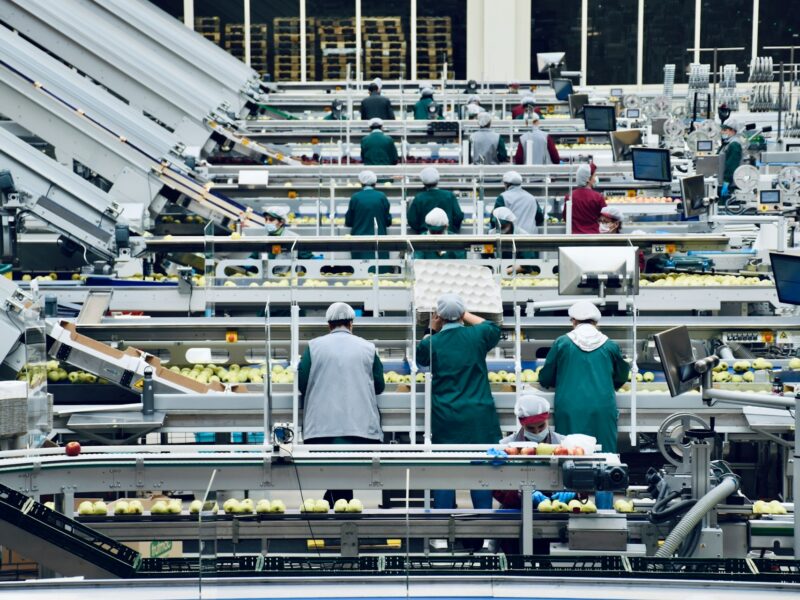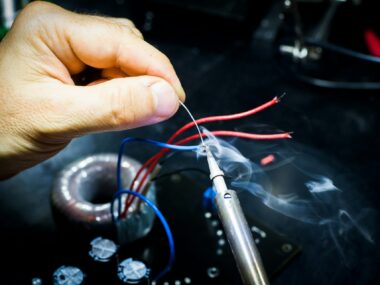In today’s fast-paced world, the food manufacturing industry is experiencing a technological revolution that’s changing the way we produce, process, and package our food. From smart sensors to artificial intelligence, innovative technologies are reshaping every aspect of food production.
This blog post will explore the groundbreaking advancements that are transforming the landscape of food manufacturing, offering insights into how these innovations are improving efficiency, safety, and sustainability in the industry.
As we dive into the world of automation in food production, we’ll uncover the latest food tech innovations that are making waves in the industry.
Whether you’re a food manufacturer, a tech enthusiast, or simply curious about where your food comes from, this exploration of cutting-edge food manufacturing technology will give you a taste of what’s cooking in the industry’s most innovative kitchens.
Smart Sensors and IoT in Food Production
The food manufacturing industry is experiencing a technological revolution, driven by the integration of smart sensors and Internet of Things (IoT) technology. This cutting-edge food manufacturing technology is transforming every aspect of production, from raw material handling to packaging and distribution.
Real-Time Monitoring and Control
Smart sensors deployed throughout the production process continuously collect data on crucial parameters such as:
• Temperature
• Humidity
• pH levels
• Presence of contaminants
By analyzing this real-time data, manufacturers can make informed decisions and take proactive measures to optimize their processes, leading to:
✓ Improved efficiency
✓ Enhanced product quality
✓ Increased food safety
Automation in Food Production
The implementation of IoT in food manufacturing enables unprecedented levels of automation. This technology allows for:
- Predictive maintenance strategies
- Real-time equipment performance monitoring
- Early identification of potential issues
By leveraging these capabilities, food manufacturing companies can:
• Reduce costly breakdowns
• Minimize production delays
• Extend the lifespan of expensive machinery
The result? A significant improvement in operational efficiency and bottom-line results for food manufacturers embracing this innovative technology.
Artificial Intelligence and Machine Learning in Food Processing
The integration of smart sensors and Internet of Things (IoT) technology is ushering in a new era of modern food processing. These food tech innovations are transforming the industry by providing real-time data and insights throughout the production process. Here’s how:
- Enhanced Monitoring: Smart sensors deployed across various stages of food production measure critical parameters like temperature, humidity, and pH levels.
- Proactive Quality Control: Continuous data collection and analysis enable manufacturers to make informed decisions and take preventive measures.
- Predictive Maintenance: IoT-enabled equipment monitoring helps identify potential issues before they lead to costly breakdowns or delays.
By leveraging these cutting-edge technologies, food manufacturers can improve efficiency, quality, and safety in their operations. As these food tech innovations continue to evolve, we can expect even more sophisticated solutions to emerge, further revolutionizing the landscape of modern food processing.
Robotics and Automation in Food Manufacturing
Revolutionizing Production Lines
Food manufacturing technology has undergone a significant transformation in recent years, with robotics and automation leading the charge. These innovations are reshaping production lines, dramatically enhancing efficiency, and improving worker safety.
As the food tech sector continues to evolve, robotic systems are becoming increasingly sophisticated, capable of handling delicate tasks once thought to be exclusively human domain.
Key Benefits of Automation in Food Production
• Increased Efficiency: Modern food processing facilities are increasingly utilizing robotic arms and automated systems for tasks such as sorting, packaging, and palletizing. These machines work tirelessly around the clock, maintaining consistent quality and speed that surpass human capabilities.
• Enhanced Safety: Robots can operate in environments that may be hazardous or uncomfortable for human workers, such as extreme temperatures or areas with potential chemical exposure.
• Collaborative Workforce: The introduction of collaborative robots, or “cobots,” is creating a new paradigm in food manufacturing. These robots work alongside human employees, assisting with repetitive or physically demanding tasks.
As automation in food production continues to advance, it’s clear that the future of food manufacturing will be shaped by these technological innovations, promising increased productivity, improved safety, and higher-quality products for consumers.
3D Printing in Food Production
3D printing technology is at the forefront of food tech innovations, transforming the landscape of modern food processing. This cutting-edge approach offers unprecedented opportunities for customization and creativity in food production:
- Personalized Nutrition: 3D printing enables the creation of foods tailored to individual dietary needs, opening new avenues for health-conscious consumers.
- Intricate Designs: Manufacturers can now produce complex food shapes and textures previously impossible with traditional methods, enhancing both visual appeal and the eating experience.
- Efficient Production: This technology streamlines the food manufacturing process, reducing waste and improving productivity.
As 3D printing continues to evolve, it promises to play an increasingly vital role in shaping the future of food production. For industry leaders and innovators looking to stay ahead of the curve, visit Pasc-fhcp.com to learn more about emerging trends and opportunities in food tech.
Blockchain Technology in Food Traceability
Modern food processing is undergoing a significant transformation, thanks to innovative food tech solutions like blockchain. This groundbreaking technology is reshaping how we track and verify our food from farm to table, offering unparalleled benefits:
- Enhanced Traceability: Blockchain creates an immutable record of each step in the food supply chain, allowing for rapid identification of contamination sources.
- Fraud Prevention: By providing verifiable proof of origin and production methods, blockchain helps combat food fraud, especially for premium products.
- Consumer Trust: With access to detailed product information, consumers can make more informed choices, boosting confidence in the food industry.
As food tech innovations continue to evolve, blockchain stands out as a crucial tool in ensuring food safety, authenticity, and transparency. Its implementation is not just a trend, but a necessity in our increasingly complex global food system.
Sustainable Packaging Innovations
As environmental concerns intensify, food manufacturing technology is evolving to meet the challenge. Sustainable packaging innovations are at the forefront of this revolution, addressing plastic waste while offering brands new ways to differentiate themselves in an eco-conscious market. Simultaneously, automation in food production is transforming the industry, increasing efficiency and reducing costs.
Biodegradable Solutions
One of the most promising food tech innovations is the development of biodegradable and compostable packaging materials. These plant-based alternatives break down naturally, leaving no harmful residues. Food manufacturers are rapidly adopting these materials for a wide range of products, from snacks to beverages.
Edible Packaging: The Ultimate in Sustainability
Taking sustainability even further, edible packaging eliminates waste. From water bottles to ice cream containers, these innovative solutions are not only environmentally friendly but also offer unique marketing opportunities for forward-thinking brands.
Automation: Enhancing Efficiency and Quality
Alongside these packaging innovations, automation in food production is revolutionizing the industry. Automated systems are improving product consistency, reducing contamination risks, and increasing production speeds. This synergy of sustainable packaging and advanced automation is shaping the future of food manufacturing technology, promising a more efficient and environmentally responsible industry.
Conclusion
The food manufacturing industry is undergoing a technological revolution that’s reshaping every aspect of production. From smart sensors and AI to blockchain and sustainable packaging, these innovations are driving improvements in efficiency, safety, and sustainability.
As consumers become more conscious about the origin, quality, and environmental impact of their food, manufacturers who embrace these innovations will be better positioned to meet these demands and build trust with their customers.
Looking ahead, we can expect to see even more exciting developments in food manufacturing technology. As these innovations continue to mature and new ones emerge, they will undoubtedly bring about further improvements in food quality, safety, and sustainability.
By embracing innovation and leveraging the power of modern food processing technologies, manufacturers can not only improve their operations but also contribute to a more efficient, sustainable, and transparent food system for all.






